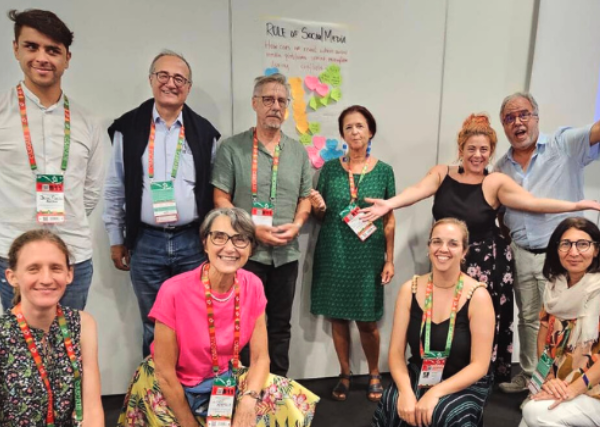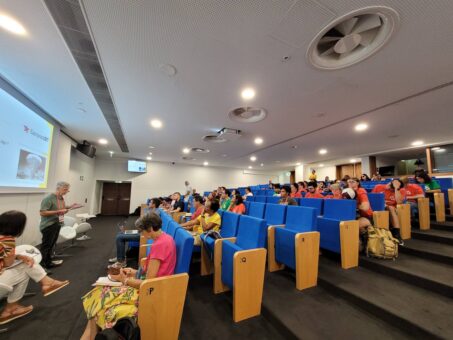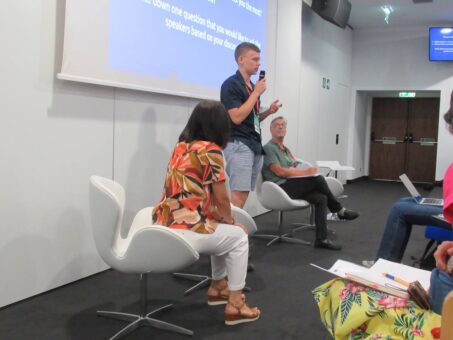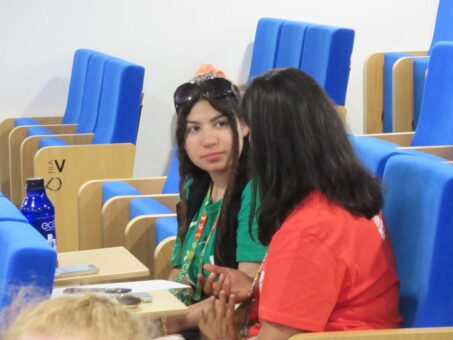Communication in times of war: a transversal dialogue for a common ethics

During the World Youth Day 2023 in Portugal, DIALOP’s journey goes one step further. From 20 countries, 134 young peolpe participated in the workshop “Communication in times of war” promoted by DIALOP during the WYD to discuss how social media and digital technology may become traps of conspiracy and tendentious interests during conflicts.
The journey
Christianity and Socialism – two movements with very different characteristics – have been for long at loggerheads with each other, but have nevertheless both shaped world history in past centuries. It is based on the idea that the biggest challenges of the world today cannot be solved alone, DIALOP fosters dialogue of good willing persons, with secular and religious backgrounds, especially between Socialist/Marxists and Christians to create a transformative transversal ethic.
Bringing DIALOP to the World Youth Day is part of the “DialogUE Project” which, in collaboration with the European Community involves 14 civil society organizations, explores and develops the often challenging dialogue between different groups, in order to shape a Europe that is ever more an expression of that “unity in multiplicity”.
 The preparation involving both Christian and Marxist-socialist experts started 6 months before the event, a committed and laborious path towards the WYD. The challenges were many, such as finding a dynamic way of mediating heavy content like conflict and communication, different languages, countries and backgrounds. “The emotion of standing before a generation that is hungry for a calming, reasoned, clear truth and hope and being able to give some of this”, Luisa Sello, one of the coordinators of the project shares her impressions.
The preparation involving both Christian and Marxist-socialist experts started 6 months before the event, a committed and laborious path towards the WYD. The challenges were many, such as finding a dynamic way of mediating heavy content like conflict and communication, different languages, countries and backgrounds. “The emotion of standing before a generation that is hungry for a calming, reasoned, clear truth and hope and being able to give some of this”, Luisa Sello, one of the coordinators of the project shares her impressions.
Youth in dialogue
War and its destructive potential influence the structure of communication, transform the perception of facts, and instrumentalize language and mindsets. In such context, social media and digital technology may become traps of conspiracy and tendentious interests. Can we approach the truth? Can we react or are we convicted to destroy relationships with humans, countries, populations because of lies and misinformation? How can we keep making choices, build relationships, and stand with truth and justice?
The workshop addressed all these challenges and engaged the youth to build on proposals for the European Union, which will be collected and presented to the EU within the European Commission funding project CERV (Citizens, Equality, Rights and Values Programme) in March 2024. After panels and dynamics discussions, the question “what can we do?” resonated among the youth. The desire of being part of a transformation as a changemaker is at the heart of each young person present.
 Steven, from the USA, wants to become a priest and travel overseas to help people shared his perplexities: “I can’t even tell my parents to stop reading sources of information that are problematic. When Jesus returned from Nazareth he was rejected by his family. So many of us have lost hope. Where do we get our hope back? That’s why we’re here at the WYD.”
Steven, from the USA, wants to become a priest and travel overseas to help people shared his perplexities: “I can’t even tell my parents to stop reading sources of information that are problematic. When Jesus returned from Nazareth he was rejected by his family. So many of us have lost hope. Where do we get our hope back? That’s why we’re here at the WYD.”
Adriana, a journalism student from Argentina felt encouraged by the workshop “Our role as the youth is very important to fight against disinformation and it can be done also in a fun way. If we create community we can be stronger.”
Towards a transversal ethics
The course of history depends not only on the strength of ideas but more heavily on the evolution of political and economic interests that integrate more than once only pale reflections of these ideas. The calling of Pope Francis in 2014 that inspired DIALOP to initiate a transversal dialogue continues to unfold.
 When asked by a young person how to create a common ethical framework when there is so much division, Walter Baier, the President of the Party of the European Left answered: “Pope Francis said that we have to accept conflict as something natural, what we need to know is what to do with the conflict. The fact that Christians and marxists coming from very different traditions, even with very different languages, can sit together and work on a common framework is an example of dialogue.”
When asked by a young person how to create a common ethical framework when there is so much division, Walter Baier, the President of the Party of the European Left answered: “Pope Francis said that we have to accept conflict as something natural, what we need to know is what to do with the conflict. The fact that Christians and marxists coming from very different traditions, even with very different languages, can sit together and work on a common framework is an example of dialogue.”
Angelina Giannopoulou, from transform!europe and José Manuel Pureza from Bloco de Esquerda also lectured besides Michele Zanzucchi and Ana Clara Giovani from Sophia University together with Maria Chiara de Lorenzo from the Focolare Movement. In the future, as part of DialogUE Project, DIALOP will hold other symposia on ecology and social policies. For more information, access https://dialop.eu


